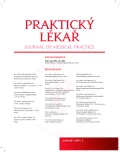-
Medical journals
- Career
Vascular and Psychosocial Risk Factors of Mild Cognitive Impairment – pilot study
Authors: J. Janoutová 1,2,3; M. Kovalová 1; P. Ambroz 1; O. Machaczka 1; A. Zatloukalová 1; K. Němček 1; E. Mrázková 1; O. Košta 1; V. Janout 1,2
Authors‘ workplace: Ostravská univerzita v Ostravě Lékařská fakulta Ústav epidemiologie a ochrany veřejného zdraví Vedoucí: doc. MUDr. Rastislav Maďar, Ph. D., FRCS Univerzita Palackého v Olomouci Fakulta zdravotnických věd 1; Centrum vědy a výzkumu Ředitel: prof. MUDr. David Školoudík, Ph. D., FESO 2; Ústav zdravotnického managementu Přednosta: doc. MUDr. Jana Janoutová, Ph. D. 3
Published in: Prakt. Lék. 2019; 99(2): 64-67
Category: Of different specialties
Overview
Mild cognitive impairment (MCI) is a transitional phase between cognitive changes in physiological aging and early dementia. The amnestic form of MCI is considered a precursor to Alzheimer’s disease. It is assumed that for MCI are the same risk factors as for Alzheimer’s disease. Department of Epidemiology and Public Health, Faculty of Medicine University of Ostrava and Institute of Animal Physiology and Genetics, Academy of Sciences of the Czech Republic collaborate on case control study, which identifies the most significant risk factors of mild cognitive impairment. In a pilot study significant difference in gender, occupation and visiting theatre were found. There were more females with cognitive impairment and problems with memory started earlier
Keywords:
dementia – mild cognitive impairment
Sources
1. Alzheimer’s Disease International. World Alzheimer Report 2014 [online]. Dostupné z: https://www.alz.co.uk/research/WorldAlzheimerReport2014.pdf [cit. 2019-02-13].
2. Bartoš A, Raisová M. Testy a dotazníky pro vyšetřování kognitivních funkcí, nálady a soběstačnosti. Praha: Mladá fronta 2015.
3. Cooper C, Sommerlad A, Lyketsos CG, Livingston G. Modifiable predictors of dementia in mild cognitive impairment: a systematic review and meta-analysis. Am J Psychiatry 2015; 172(4): 323–334.
4. Fratiglioni L, Viitanen M, von Strauss E, et al. Very old women at highest risk of dementia and Alzheimer’s disease: incidence data from the Kungsholmen Project, Stockholm. Neurology 1997; 48(1): 132–138.
5. Fratiglioni L, Wang HX, Ericsson K, et al. Influence of social network on occurrence of dementia: a community-based longitudinal study. Lancet 2000; 355 : 1315–1319.
6. Höschl C, a kol. Alzheimerova choroba. Praha: Galén 1999.
7. Janoutová J, Ambroz P, Kovalová M, a kol. Epidemiologie mírné kognitivní poruchy. Cesk Slov Neurol N 2018; 81(3): 284–289.
8. Jirák R, a kol. Gerontopsychiatrie. Praha: Galén 2013.
9. Kalvach Z, Zadák Z, Jirák R, a kol. Geriatrie a gerontologie. Praha: Grada Publishing 2004; 547–548.
10. Ministerstvo zdravotnictví ČR. Koncepce Alzheimer [online]. Dostupné z: http://www.mzcr.cz/Odbornik/dokumenty/definitivni-navrh-koncepce-alzheimer_10078_2785_3.html [cit. 2019-02-13].
11. Letenneur L, Gilleron V, Commenges D, et al. Are sex and educational level independent predictors of dementia and Alzheimer’s disease? Incidence data from the PAQUID project. J Neurol Neurosurg Psychiatry 1999; 66(2): 177–183.
12. Li R, Singh M. Sex differences in cognitive impairment and Alzheimer’s disease. Front Neuroendocrin 2014; 35(3): 385–403.
13. Lužný J. Gerontopsychiatrie. Praha: Triton 2012.
14. Marioni RE, Proust-Lima C, Amieva H, et al. Social activity, cognitive decline and dementia risk: a 20-year prospective cohort study. BMC Public Health 2015; 15 : 1089.
15. Mayo Clinic. Mild cognitive impairment (MCI) [online]. Dostupné z: https://www.mayoclinic.org/diseases-conditions/mild-cognitive-impairment/symptoms-causes/syc-20354578 [cit. 2019-02-13].
16. Meng XF, Yu JT, Wang HF, et al. Midlife vascular risk factors and the risk of Alzheimer’s disease: a systematic review and meta-analysis. J Alzheimers Dis 2014; 42(4): 1295–1310.
17. National Institute on Aging. About Alzheimer’s Disease: Causes [online]. Dostupné z: http://www.nia.nih.gov/alzheimers/topics/causes [cit. 2019-02-13].
18. Petersen RC. Mild cognitive impairment as a diagnostic entity. J Intern Med 2004; 256(3): 183–194.
19. Petersen RC, Morris JC. Mild cognitive impairment as a clinical entity and treatment target. Arch Neurol 2005; 62 : 1160–1163.
20. Ronksley PE, Brien SE, Turner BJ, et al. Association of alcohol consumption with selected cardiovascular disease outcomes: a systematic review and meta-analysis. BMJ 2011; 342: d671.
21. Scheltens P, Blennow K, Breteler MM, et al. Alzheimer’s disease. Lancet 2016; 388(10043): 505–517.
22. Sheardová K. Mírná kognitivní porucha v praxi. Psychiat pro Praxi 2010; 11(2): 62–65.
23. Sheardová K, Hudeček D. Prevence demence a životní styl. Neurol. praxi 2011; 12(6): 418–421.
24. Wang HX, Karp A, Herlitz A, et al. Personality and lifestyle in relation to dementia incidence. Neurology 2009; 72(3): 253–259
Labels
General practitioner for children and adolescents General practitioner for adults
Article was published inGeneral Practitioner

2019 Issue 2-
All articles in this issue
- Hypoglycaemia in type 2 diabetes mellitus – a brief overview for clinical practice
- Management of hypoglycaemia in everyday clinical practice
- Alcohol abuse and oncology
- Vascular and Psychosocial Risk Factors of Mild Cognitive Impairment – pilot study
- Trends in care in nursing homes in the Czech Republic
- Remaining traces of the Hippocratic oath in medical graduation pledges
- Purple urine bag syndrome
- General Practitioner
- Journal archive
- Current issue
- Online only
- About the journal
Most read in this issue- Remaining traces of the Hippocratic oath in medical graduation pledges
- Management of hypoglycaemia in everyday clinical practice
- Trends in care in nursing homes in the Czech Republic
- Alcohol abuse and oncology
Login#ADS_BOTTOM_SCRIPTS#Forgotten passwordEnter the email address that you registered with. We will send you instructions on how to set a new password.
- Career

